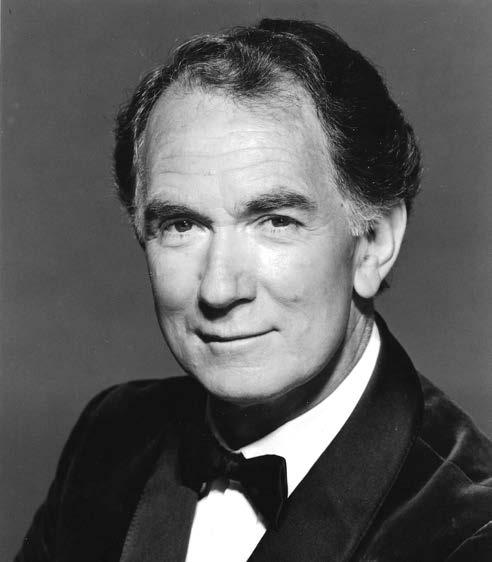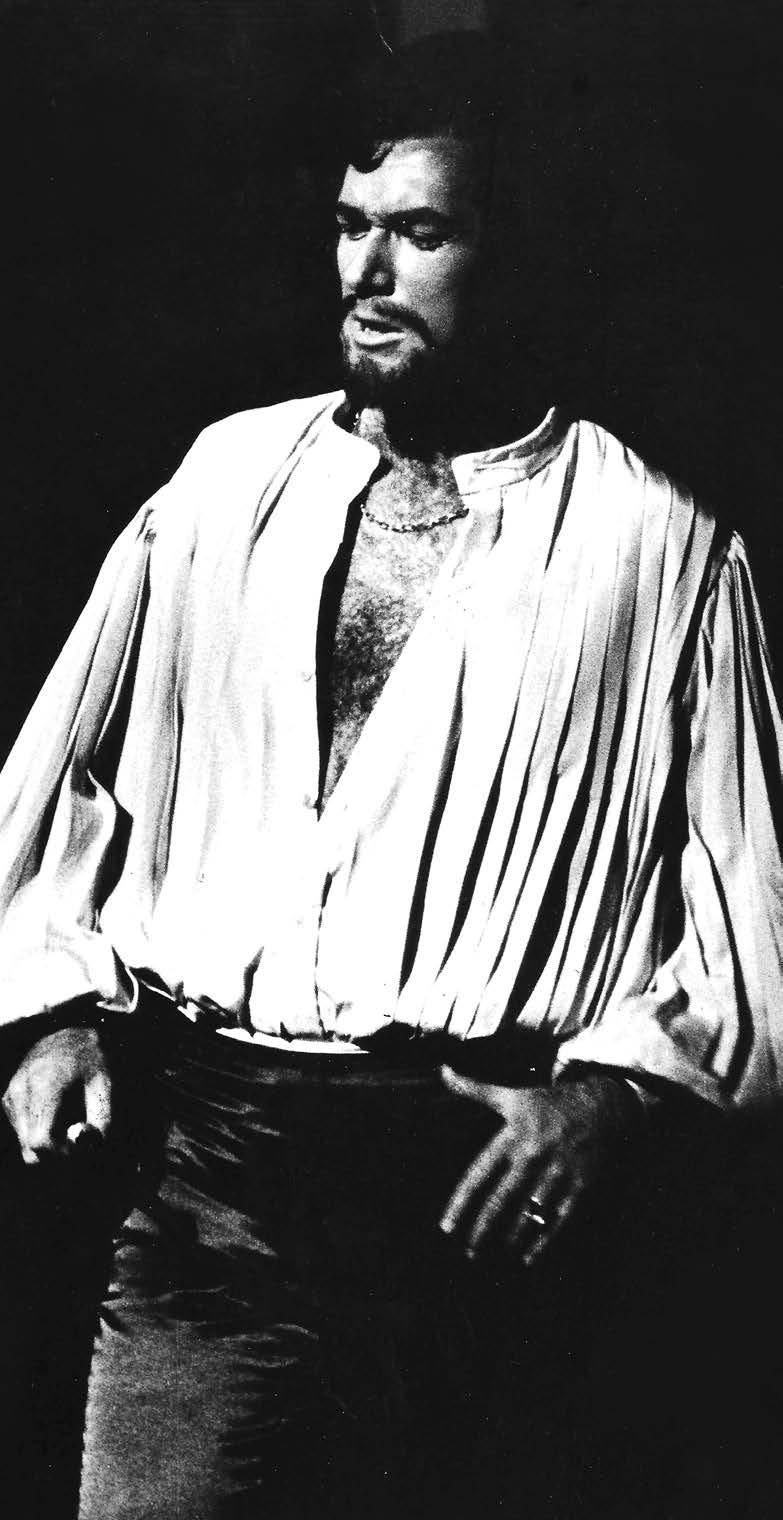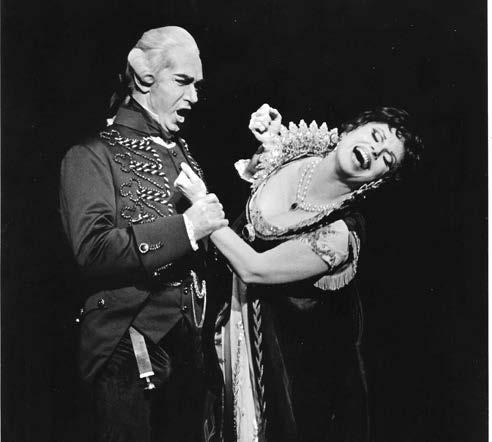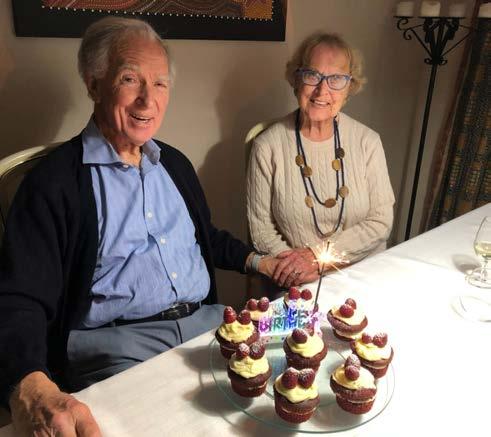
7 minute read
Feature Story
The opera star on the peninsula
Geoffrey Chard has been guest at Buckingham Palace and played tennis at Wimbledon, but of all his achievements, it is this Hunters Hill local’s stellar career in opera that has won him a place as an Australian icon.
Advertisement
WORDS TRACEY PORTER
Geoffrey William Chard AM is perhaps Australia’s most enduring and revered opera singer. For classical music and opera fans, he is a household name. In the local community, he is known as the President of Hunters Hill Music. To the country, he is a Member of the Order of Australia for services to opera. To others, he’s Dad, or Geoff. Right now, he is the man at the end of a telephone line with an exceptionally velvety and captivating speaking voice.
A suite of providential events and tragic circumstances have landed Chard among the harbour views, warm sandstone walls and tree-lined streets of the sleepy Hunters Hill peninsula, and at 90-years old his memory is sharp and his recollections voluminous.
His list of performing roles is staggering: Don Alfonso in Così fan tutte, Rangoni in Boris Godunov, Scarpia in Tosca, Nick Shadow in The Rake’s Progress, Balstrode in Peter Grimes and the title role in Gianni Schicchi. Plus of course Don Giovanni on many, many occasions.
In his early life as a singer and actor, he appeared in the inaugural production of the Australian Elizabethan Trust Opera Company – the forerunner to Opera Australia.
In the early 60s his career went stratospheric in the UK, while he spent later years as a member of the Australian National Opera and all the state opera companies. He is well known for his part in the huge Australian success, Voss.
Today, he is upbeat, energised and jokes, “We’re going to talk about my favourite subject and of course, that’s me.”
In the beginning
It was Chard’s mother who was first to instil in him an appreciation of musical performance and it was the female congregation at the Anglican church in his home suburb of Hurstville Grove who introduced him to the potency of a church choir.
Young Chard loved to sing. But never was performing considered a career option.
“I hated school, actually. I wanted to be grown-up, and so I went to the business college in Sydney.
“I got a clerical job, did an accounting course and eventually became the company secretary of the firm I was working for,” he recalls.
With the day job paying the bills, Chard joined amateur musical societies and spent his spare time in the evenings singing at community events and performing on the showboats in the city at the weekend.
“Singing just became part of things,” he reflects. “There was an opportunity to learn those things which isn’t available today. There were all sorts of embarrassments and experiences. There was even an opportunity to sing overseas, as we called it, by going across the harbour and singing in Mosman.”

As Don Giovanni
A turning point came when the sister of a friend requested that he make his singing debut at her wedding. Underplaying the significance of it all he says, “I suppose I liked the feeling of it.”
Eager to retain that “feeling” and use his musical society experience, Chard accepted a role in Puccini’s La Bohème for a small opera company in Rockdale. He also undertook some training at Sydney’s Conservatorium of Music.
Chard says it was around this time that the NSW National Opera Company was forming and his career started to turn professional.
It was also through this time Chard met and fell in love with a “lovely and beautiful soprano” called Marjorie Conley. Not only did she stand alongside him as their stars went into ascent, she also granted him the honour of being her husband and later fell pregnant with their child.
Sadly however, in 1959, two years after giving birth to their son David, Marjorie passed away. Chard, perhaps preferring not to dwell in the past, speaks few words about the events, but admits that he was “not emotionally equipped to deal with it.”
“Marjorie died when we were in Queensland. We had no choice but to go back and live with my parents and I didn’t like that.”
The English chapter
Chard was not content to give up singing, and he knew that the only way to garner a professional, sustainable, and well-paid career as an opera singer was to relocate overseas. He set himself a target to spend one year in London and come back for David when he was established.
In 1961, Chard left Australia for London. In those 12 months, he secured work as an opera singer, found an agent and made friends with people who knew of his plan to bring David over to the UK. “I returned to London in 1962. That winter was freezing, really cold. They were calling it ‘The Big Freeze’ and David and I were moving from one digs to another. Friends of mine had said they could help, but they were busy too with their jobs and families.”

In Tosca

With wife Margaret
“In the end, I was lucky. I found us some good, long-term digs. The elderly landlady was recently bereaved. We rented rooms in her home, and she helped me to care for David.
“For me it was always important to be there in the morning for breakfast and the late afternoon for our evening meal together. But having someone there to care for David meant I could work during the day and at night.”
Chard did not waste a moment in the UK. He was welcomed by the Welsh National Opera, sang at Glyndebourne, the Royal Opera Company at Covent Garden, and performed at the Aldeburgh and Edinburgh Festivals.
He was a principal baritone with the English National Opera for 15 years, from 1968 to 1983, performing many major roles, including some roles which were specially written for him.
David was always by his side and attended six schools during his time in the UK. “Some people ask if it affected him,” he says. “We spoke about it recently and he said no; that’s the cards life deals you. I think it worked out well. He’s a lovely chap.”
Chard counts a performance at Buckingham Palace and a game of tennis with the British Consul at Wimbledon among his most memorable achievements.
Meanwhile, it was in the UK that he met a “wonderful English lady” by the name of Margaret to help heal his heart, follow him down the aisle, and take over the role as his most ardent supporter. Margaret and Geoffrey are still enjoying their later years together.
A place called home in Hunters Hill
In the mid-80s, when Chard was in his early 50s, he made the decision to call time on his career in London and return to Sydney, initially intending to return to south west Sydney, where he spent much of his early life.
“David had already returned to Australia and my father was still alive then,” he explains, “My agent said I should come back to Australia while still in robust form to continue singing. I thought I would spend six months here, and six months there.
“The upheaval of moving lock, stock and barrel, selling your house and coming back to no particular address was quite astonishing,” he says. “A friend lent us a temporary place in Hunters Hill. We liked the area very much and went about seeing how we could get a toe hold here.”
While it was tough settling at first, his immense reputation soon saw him reclaim his place among Australia’s operatic elite with roles such as Nick Shadow in The Rakes Progress, the title role in Gianni Schicci, Balstrode in Peter Grimes, Don Pizarro in Fidelio, Paolo in Simon Boccanegra, Tonio in Pagliacci and in the title role of the award-winning Voss, which was premiered at the Adelaide Festival in 1986, televised nationally and received with great acclaim.
Giving back
For some time upon his return from the UK, Chard taught at the Australian National Academy of Music, the Conservatorium and to private clients. In addition to his appointment of a Member of the Order of Australia for his services to opera, he was also made a life member of the Savage Club and received two Green Room Awards - peer awards that recognise excellence in cabaret, dance, drama, musical theatre and opera. “While one doesn’t flaunt those awards around the place, I am quite proud of the AM,” he notes bashfully.
Chard may well have retired from his professional singing career, but he keeps busy with an active interest in the community. Currently president of Hunters Hill Music, when not playing host to David or grandchildren Lauren (28) and Elliot (24), he is also a member of the Hunters Hill Tennis Club and enjoys a round of golf or two, although he admits that a motor vehicle accident in 2000 that resulted in him fracturing his neck and back means he hits the balls with less force these days.
Prior to lockdowns, appearances honouring his work in Voss – on its 35th anniversary - had been scheduled. Instead, he is using this downtime wisely by turning his attention to the finishing touches of his autobiography. “I don’t know whether it will ever get published,” he notes, “But it’s definitely full of some wonderful tales.”

